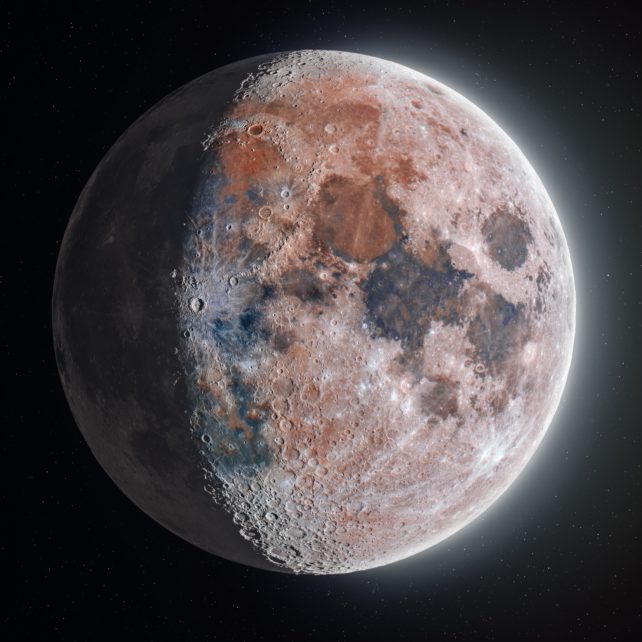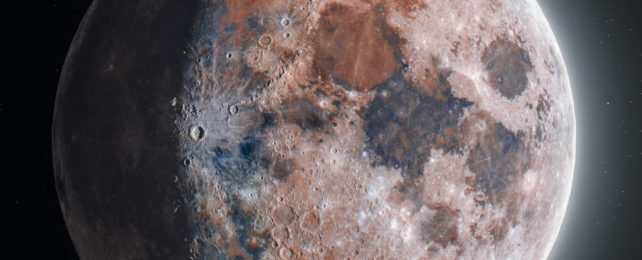Time to upgrade your wallpapers, people.
Two astrophotographers have just dropped what they call "the most ridiculously detailed picture" of the Moon – the result of a painstaking, neck-craning effort roughly two years and over 200,000 frames in the making.
For millennia, humans have looked up and seen the same silver orb traversing the night sky – but never quite like this. As space photography enthusiast Andrew McCarthy says of his collaboration with planetary scientist Connor Matherne, "behold" this stunning image:

While you feast on this 174-megapixel beauty, you can see the Moon tinged red and gunmetal blue, illuminated on the right-hand side as it faces Earth. The red patches are iron and feldspar oxidized by errant oxygen atoms from Earth, McCarthy explained to inquisitive viewers on Twitter.
Though the colors may look false, they are technically the Moon's true hues, only that our eyes are not sensitive enough to see them, and so McCarthy gave the image a saturation boost to bring out the colors in all their glory.
McCarthy's specialty is actually detailed photographs, taking tens of thousands of photos to capture every nook, cranny and crater on the lunar surface. Matherne, a planetary scientist and deep space photographer shooting from Louisiana, is the color buff we also have to thank.
As for how it was made, the masterpiece consists of more than 200,000 images, all taken over the course of a single evening and stacked together.
"The whole thing is assembled like a mosaic, and each tile is made up of thousands of photos," McCarthy told NPR, simplifying what must have been a lengthy editing process.
The pair have certainly outdone themselves and given NASA's James Webb Space Telescope a run for its money.
But it is another NASA mission – one gearing up to return humans to the Moon for the first time since 1972 – that inspired their artistic effort.
"This image is a love letter to the upcoming Artemis 1 mission, the first human-rated lunar launch vehicle in 50 years," McCarthy tweeted.
The first major milestone in that mission, due to launch on August 29, is an uncrewed test flight of the Space Launch System, a super heavy-lift rocket capable of (hopefully) slingshotting astronauts around the far side of the Moon.
Later, Artemis missions plan on landing astronauts near the Moon's permanently shadowed patches.
This is not the first time McCarthy and Matherne, who first connected over Reddit, have gifted us jaw-dropping photos of the Moon and other celestial bodies in delectable candy colors.
My photo of the Trifid Nebula, a small nebula located 4,000 light years away.
— Connor Matherne (@MatherneConnor) August 22, 2022
While technical details are cool and all, I think it looks like forbidden cotton candy and I really haven't gotten past that. pic.twitter.com/x25HbS0DOo
Two years ago, the pair shared their first composite picture of the Moon, which in retrospect looks quite muted compared with their newest revelation, but stunned viewers at the time.
And in 2019, McCarthy posted this grayscale photograph of our Moon shrouded in light and floating serenely in space, somewhat reminiscent of the iconic Earthrise image snapped by astronaut Bill Anders aboard Apollo 8.
While that kind of photo is out of the reach of us Earth-grounded folk, the awe-inspiring photographs that McCarthy and Matherne produce using basic equipment – a camera, tripod and star tracker – are not.
However, as McCarthy told NPR, it takes a lot of patience to come up with the goods, and most nights, he walks away empty-handed.
"Anybody can do it, but it takes a special temperament," he said.
